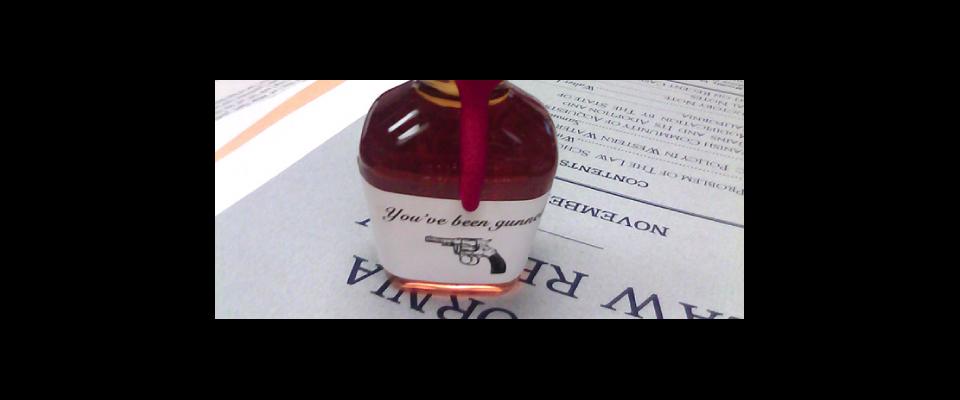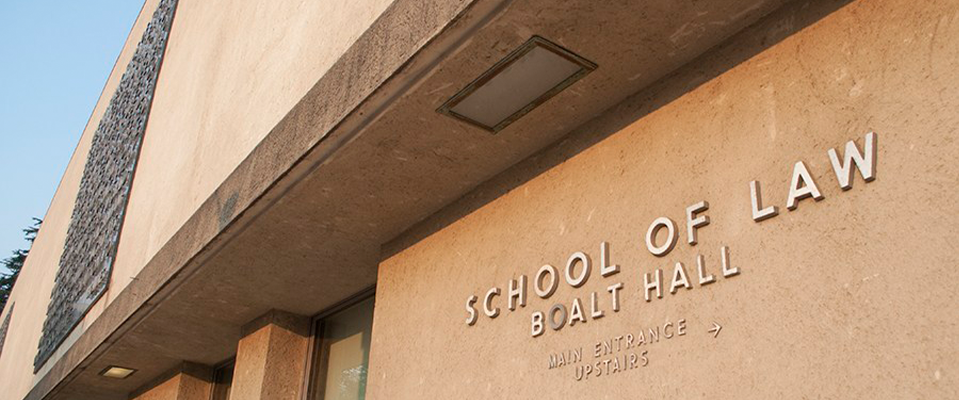Berkeley Law’s venerable secret society and its poster-Justice.
Early in the morning of February 13, 2012, a strange thing happened in Boalt Hall. The floor of little Room 37, whose wrap-around glass walls earned it the nickname The Fishbowl, was blanketed with orange beach balls bearing the letters GC. On the round table in the center stood a framed photo of Boalt alumnus and former Chief Justice of the Supreme Court Earl Warren ’12, J.D. ’14, surrounded by various candies, candles, and long-stemmed roses. A nearby trash bin filled with ice cradled two bottles of champagne.
Most important was a piece of paper on which was printed a poem, attributing blame (or credit) for the incident to the Gun Club, a nearly 120-year-old all-male secret society dedicated to alcohol and poetry.
Warren, who studied law at Berkeley from 1912 to 1914, is the club’s most famous member and enduring figurehead. His memoirs, published in 1977, contain a veiled reference to the Gun Club. “I belonged to an organization which met … once a week for dinner and to read poetry over a few steins of beer,” Warren wrote. “The group will go unnamed….”
His coyness was for naught; a Time magazine article published on October 12, 1953—a week after Warren’s appointment to the Supreme Court—noted that “he was a popular member of the Gun Club, which headquartered at Pop Kessler’s saloon,” a downtown Oakland bar popular among fraternity members since the late 1800s. Later, in Chief Justice: A Biography of Earl Warren, author Ed Cray wrote that “Membership in the society, based on companionship rather than social standing, nurtured Warren’s idealism.” And in an obscure 1972 oral history kept in the Bancroft Library, Boalt alumnus Newton Drury reveals he was a member of the same Gun Club class as both Warren and future Eisenhower aide Herman Phleger.
Upon discovering the Fishbowl prank, Boalt Director of Student Services Mindi Mysliwiec did what she always does: Call Bill Benemann. The law school’s archivist has been staff liaison to the secretive club for five years, and can confirm whether a particular stunt was perpetrated by them—or let members know when they’ve gone too far.
The dozen or so current members of the Gun Club—third-year law students all—guard their secrecy tightly: Even roommates and girlfriends are out of the loop. Benemann secured their permission before granting an interview, and reported that no current member would be willing to talk, anonymously or otherwise.
Yet the club faces the annual task of replenishing itself, and thus must make itself known. Its one or two stunts a year serve as both entertainment and public relations. In September 2010, a new class of Gun Club members placed small bottles of Maker’s Mark whiskey on each seat in a 1L Torts class, with labels pronouncing “You’ve been gunned.” Earlier in the year, small posters appeared throughout Boalt Hall bearing the visage of embattled professor John Yoo and the caption “I’m sorry, for everything.” After a few days, a full keg and an ice bucket appeared in the student center. Nearby was another photo of Earl Warren.
One of the Gun Club’s most elaborate stunts began with a note under Benemann’s door in 2005: a poem, naturally, printed on a sheet of paper cut in the shape of a whiskey flask. The words pointed to a “hidden tome” in the law school library, which Benemann swiftly emancipated. Tucked inside was another rhyming poem, this one alluding to a second “tome well hid” about “men who lived for the drink and died by the gun.” On the back of the verse was an image of a splayed-open book, a flask-sized nook cut from its pages. This treasure-hunt proved too trying, and in the Fall 2005 issue of the Boalt Hall Transcript, Benemann appealed for help.
Nothing came of it, and the search died down—until late 2007 or early 2008, when an unsuspecting student worker in the library came across Guns of the Old West by Charles Edward Chapel. Inside was a filled stainless-steel flask emblazoned with the words “Gun Club.” Today both book and flask (contents intact) remain in Benemann’s office, along with other artifacts—including a recently acquired leather-bound, untitled book of Gun Club poetry dating to the early 1920s.
Shortly before the flask was discovered, a student entered Benemann’s office and identified himself as a member of the Gun Club. He’d serve as a contact in case the school needed to convey a message—or the other way around. Every fall since, the ritual has repeated. And every spring, Benemann meets members of the Gun Club’s outgoing class for a secret off-site luncheon, allowing him to see their faces before they graduate and the next group arrives.
“The one thing that they have in common is that they like to party and they have this creative streak and a wonderful sense of humor,” he said. “They’re blowing off steam, but they do it in a way that’s kinda cool. I kind of think of them as Mad Men meets Animal House. It’s classy and old-fashioned, but at the same time, when they get drunk, they get drunk.”
At its heart, the Gun Club is little different from Boalt’s 65 or so other student groups. “Law school can be a very overwhelming, very alienating, very mentally and physically exhausting experience,” Benemann said. “The whole idea is to get a group of people together who are like-minded who have your back.” By the same token, their antics inject a measure of levity into campus life.
Professor Bob Berring first learned about the Gun Club upon joining the faculty in the early 1980s, and today holds it in esteem. The fraternity’s staying power in spite of its secrecy has impressed him. “They’re almost a mystical presence,” Berring said. “Everybody’s talking about it, but nobody knows what it is.”
Building Services Manager Lisa Ferrari and Director of Student Services Mysliwiec see the club differently. Until an agreement was recently brokered through Benemann requiring Gun Club members to clean up after their pranks, these two were most often stuck with the task. Both declined to comment on the club.
The student body, meanwhile, doesn’t know what to think. Anonymous reactions to Gun Club pranks exposed on popular law school student blog Nuts & Boalts (one of which Benemann says was in fact not done by the club) range from the amused (“It’s just another reason I’m glad I chose Berkeley”) and the confused (“Seems very inside joke-y, only I have no idea who the insiders are”) to the dismayed (“An all-male secret society is about as far from what Boalt is about and why I came as you can get”) and the incredulous (“The gun club doesn’t exist”).
One imagines members of the Gun Club reveling in this ambiguity. Mindful of the delicate balance and of his position as staff ally, Benemann eventually gummed up: “I’ve probably told you too much already.”





















